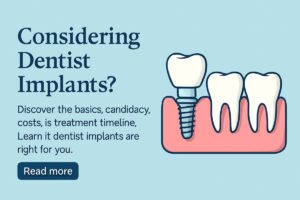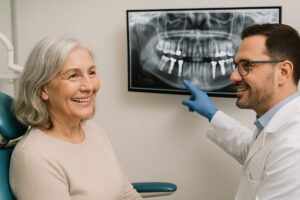If you want to fix missing teeth, this guide explains how dental implants work, what to expect, and how to choose the right care. You’ll learn why replacing missing teeth matters, the types of implant solutions, who is a good candidate, the typical treatment steps, cost factors, and why a specialist can improve outcomes. By the end you’ll know the next steps to get a personalized plan.
Why Missing Teeth Matter
Missing teeth affect more than appearance. They can make chewing and speaking harder and lower your confidence. Over time nearby teeth shift into gaps, creating bite problems. Jawbone loss also happens where roots are missing — studies show bone can shrink up to 25% in the first year after a tooth is lost. Replacing teeth early helps prevent these problems and keeps your mouth healthier long term.
How Dental Implants Work To Fix Missing Teeth
A dental implant replaces both the root and the visible tooth. Three main parts: the titanium implant (root), the abutment (connector), and the crown (the tooth you see). Implants fuse to bone for a stable foundation. Unlike bridges that rely on nearby teeth or removable dentures that sit on gums, implants protect bone and act like natural teeth for eating and speaking.
Types of Implant Solutions
Single tooth implant
Used when one tooth is missing. It replaces the root and crown without changing neighboring teeth. Pros: looks natural and preserves bone. Cons: needs enough bone and time to heal.
Implant-supported bridge
Used when several teeth in a row are missing. Two or more implants support a bridge. Pros: avoids altering healthy teeth. Cons: higher cost than a standard bridge but longer lasting.
All‑on‑X / full-arch implants (All‑on‑4 option)
A full set of teeth attached to 4–6 implants. Good for people missing most or all teeth. Pros: fixed, strong, and fast restoration of function. Cons: more complex surgery and higher upfront cost, but excellent long-term results.
Am I a Candidate to Fix Missing Teeth With Implants?
Good candidates are generally healthy, with controlled chronic conditions and healthy gums. Key factors: adequate jawbone volume, non-smoking or willing to quit, and commitment to oral hygiene. Some patients need preparatory care like bone grafts or gum treatment. Your provider will review medical history, scans, and discuss realistic expectations.
What to Expect: Consultation, Surgery, and Recovery
The process starts with an exam and CBCT 3D imaging to plan placement. A treatment plan outlines implants, any grafts, and timing. Implant placement is a minor surgery; options include guided methods like Yomi robotic-guided surgery for added precision. Healing (osseointegration) takes weeks to months, followed by the final crown or prosthetic. Expect mild swelling and pain for a few days; follow-up visits ensure proper healing and function.
Cost, Insurance, and Financing Options
Costs vary by number of implants, need for bone grafting, and type of final prosthetic. Insurance may cover part of the crown or certain procedures but often not full implant costs. Many practices offer financing or payment plans to spread costs and make treatment accessible.
Why Choose a Specialist for Implant Care
Board-certified periodontists or oral surgeons bring surgical experience and advanced planning skills, which can reduce complications and improve long-term success. Specialists often work with in-house labs and advanced imaging for predictable results.
About Gwinnett Dental Implant Center — Expertise Near Lilburn, GA
Gwinnett Dental Implant Center provides comprehensive implant and periodontal care near Lilburn, GA. Led by Dr. Melody Schiffer and Dr. Nisha Kancherla, the team uses on-site CBCT imaging, an in-house master lab, Yomi robotic-guided surgery, and offers All‑on‑X solutions. The office supports bilingual staff and flexible financing to make care accessible.
Next Steps: How To Get Started
Schedule a consultation and bring recent dental records or X-rays if available. At your first visit expect an exam, 3D imaging, and a clear treatment plan. If missing teeth are affecting eating, speech, or confidence, act now to restore function and protect your oral health.








